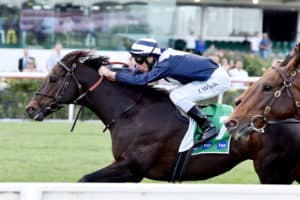Racehorse Nutrition & Feeding
How do you keep your highly trained athlete finely tuned?
The ration must be “balanced”. There are over 25 nutrients that are vitally important in the racehorse ration (including energy, protein, vitamins and minerals) and these nutrients must not only be provided for at an appropriate level but must also be present at an appropriate ratio to each other. An excess of one nutrient can cause a deficiency of another which can have a serious impact on the performance and horse health.
A good ration must be palatable. Unless the horse consumes the ration readily, it is not successful, regardless of how well-balanced. Providing a variety of feed stuffs aids in making the ration more palatable as well as improving the balance of the ration and hence preventing certain nutritional deficiencies.
In addition to a well-balanced ration, regular parasite prevention and control, proper dental care and preventative medicine (vaccinations etc) are also essential for the well-being of the racehorse.
Starting with the basics;
- Rations should contain a balance between roughages (hay and chaff) and concentrate (grains, protein meal, fats, pelleted or sweet feeds, molasses etc) relative to the horse’s energy, protein and other nutrient requirements.
- Stabled horses should be provided with a minimum daily amount of roughage equivalent to 1% of their body weight (1kg/100kg body weight) to ensure optimal digestive function.
- The amount of grain used to prepare feeds should be measured on a weight as opposed to volume basis to ensure greater uniformity of energy intake, protein and other major nutrients.
- The effects of the ration should be carefully observed and adjustments made where necessary to ensure the full ration is consumed, waste is minimised and the horse(s) are maintaining their optimum body weight and condition.
- If the ration is to be dampened, it should be mixed freshly for each feed to prevent souring, spoilage and degradation of loss of nutrient value.
Things to consider to ensure optimal utilisation of the ration;
- An adequate supply of fresh, clean water is required at all times.
- All horses should have the opportunity for free exercise every day.
- Horses in stables and yards must be fed as individuals.
- A horse in training on a concentrate ration should always be fed in proportion to the actual amount or intensity of exercise performed daily.
WHAT IS REQUIRED FROM THE DIET TO OPTIMIZE PERFORMANCE OF YOUR RACEHORSE?
- Energy is necessary to meet the demands of intense exercise however, requirements will vary depending on the level and intensity of exercise.
- Protein is essential to ensure optimal muscle mass development and maintenance, with the amino acid profile in feedstuffs being crucial to the quality of the feed and biological value of the protein source. In particular, strenuous anaerobic activity accelerates muscle turnover, thus high-quality protein is required for the repair of damaged muscle fibres.
- Vitamins (Fat & Water Soluble) are vital for life and essential for health and vitality. However, it must be considered that over supplementation of fat soluble vitamins may lead to toxicity as they accumulate in the body as opposed to excesses of water soluble vitamins which are excreted in the urine. Racehorse supplements such as Aminovite Plus supply a correct proportion of vitamins suitable for the high-performance racehorses.
- Minerals & Electrolytes: Minerals are naturally occurring substances, most of which are required in very small amounts and are referred to as trace elements. Electrolytes are essential to maintain body fluid balance and prevent dehydration by maintaining a steady environment for body cells and tissues. Salkavite is premium B-Group Vitamin and Electrolyte supplement, specifically formulated to meet the nutritional demands of racehorses.
These nutrients need to be supplied in the proper proportion, level and form to provide adequate nourishment. The relative amounts of each vary with the size, age and use of the particular horse.
It must also be considered that nutrient requirements on a body weight basis will increase in proportion to the type, intensity and duration of work, ambient temperature and horse temperament. Therefore, specific dietary evaluation and ration formulation are required.
Experts in Equine Nutrition
Every product in the Ranvet range has been developed to meet a horse’s most specific need at any given time, be it in a training environment or on a breeding farm. Having pioneered the formulation of specific medications and dietary supplements for horses, the company is now recognised as a leader in the areas of equine health and nutrition.

